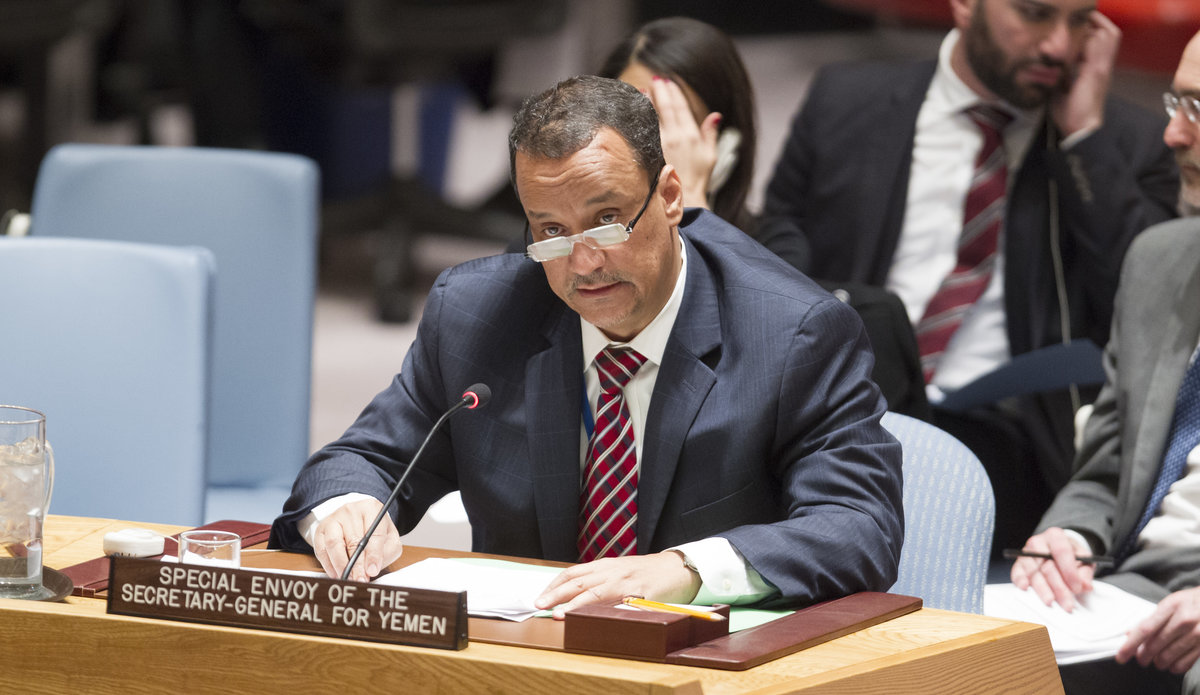Security Council briefing on the situation in Yemen, Special Envoy of the Secretary-General for Yemen, Ismail Ould Cheikh Ahmed
Mr. President,
Thank you for this opportunity to brief the Security Council once again on the latest developments in Yemen.
It has been two months since the parties met in Switzerland, for the first face to face talks of the peace process. Those talks produced agreements on several measures which have provided much needed practical and moral support to the Yemeni people, including the delivery of humanitarian aid to the city of Taiz and the release of some prisoners.
The announcement of a cessation of hostilities on the first day of the talks was accompanied by the creation of a De-escalation and Coordination Committee, aimed at strengthening adherence to the cessation of hostilities. There was also broad agreement to the principles of a general framework based on the provisions of Security Council Resolution 2216 (2015). The talks have served as the beginning of a process toward agreements on ending the war and Yemen’s return to a peaceful political transition.
The parties left the last round of talks in a positive spirit, with practical proposals, recommendations and hope for a better future for Yemen and the Yemeni people.
Tragically, the security situation in Yemen has deteriorated since the end of the talks. The latest UN reports indicate that more than 6,000 Yemenis have lost their lives since March 2015, and more than 35,000 have been injured.
Mr. President,
Yemen is living through the most heart-rending days in its history.
Many parts of Yemen are again witnessing airstrikes and extensive ground fighting. There has also been a significant increase in the number of missiles fired indiscriminately into Saudi Arabia. The escalation of military activities along with a worsening of regional tensions has created additional obstacles which threaten to delay a new round of talks.
There has been a notable upsurge in the number and magnitude of attacks carried out by terrorist groups in Aden, Lahej, Abyan, Shabwa and Sana’a. There have been attacks on Yemeni Army checkpoints and residences of key security officials. The assassination of prominent political and security officials in the South of the country has continued unabated. On 28 January, an attack on the Presidential Palace in Aden resulted in the death of eight people including civilian bystanders. Earlier today, a suicide bomber attacked a Yemeni army camp in Aden, reportedly killing at least ten people.
I have repeatedly underlined the increasing presence of terrorist groups in Yemen which create a long-term threat for the country and the region. The absence of the State in many parts of Yemen has facilitated the expansion of these terrorist groups. Al Qaeda and the Islamic State are present in many parts of Yemeni territory. There are reports of their growing influence in large areas of the governorate of Hadramout and their control of its port, maritime traffic, and illegal oil trade. Reports of attacks on civilians, including stonings, and executions of captured civilians and Yemeni army soldiers are deeply worrying.
The basic freedoms of Yemenis, including freedom of expression, continue to be undermined. There has been significant rise in the systematic persecution of civil society activists in Yemen, including reports of violent attacks and arbitrary detention of many journalists. Acts of intimidation, harassment and disappearances of journalists are a clear violation of the Universal Declaration on Human Rights.
Mr. President,
Yemenis continue to face grave violations of international humanitarian law. Respect for human rights and international humanitarian law is critical to the ability of Yemenis to survive this current crisis with dignity and safety. The agencies, funds and programmes of the UN are doing their best to uphold the rights of Yemenis and provide needed assistance. It is important that all UN staff are able to work in safety and without restriction. I call upon the Government of Yemen and all other stakeholders to uphold these principles and to respect and support the work of the UN and its agencies.
Mr. President,
I have been engaged in an intensive round of consultations with Yemeni leaders and regional partners in recent weeks. I discussed the challenges facing the peace process with the Foreign Ministers of the Kingdom of Saudi Arabia, United Arab Emirates, the Sultanate of Oman, Hashemite Kingdom of Jordan, France, the Secretary-General of the Gulf Cooperation Council, in addition to the vice Foreign Minister of Japan and the vice Foreign Minister of the Republic of Korea, all of whom underlined their continued support for an end to violence in Yemen a political settlement.
I met with Yemeni Vice President and Prime Minister Khaled Bahah on 8 and 16 January, in addition to repeated meetings with representatives of the Yemeni Government, other Yemeni leaders and civil society figures. I also traveled to Sana’a, where I met with senior officials from the Houthis and the General Popular Conference, as well as key political parties, women’s and youth groups.
During this latest round of consultations, I sought to ensure that some of the positive commitments which emerged from the talks in Switzerland were implemented. While far from a comprehensive settlement, these commitments yield tangible benefits to the Yemeni people and bolster the peace process.
I worked for the release of two Saudi nationals by the Houthis on 14 January, after almost ten months in captivity, which was welcomed by the Secretary-General and the Kingdom of Saudi Arabia. This positive development was shortly followed by the release of the Yemeni Minister of Technical and Vocational Education, Abdul Razak al-Ashwal and four Yemeni political and media activists. I will continue to press for and work towards the release of others detainees.
Building on commitments made in Switzerland, UN agencies and international NGOs expanded the delivery of assistance to Taiz, including to areas that had been cut off for many months. WHO, WFP and MSF have all been able to deliver critically needed assistance to Taiz in recent weeks and I hope that this city, and other areas which have suffered tremendously in recent months, will continue to receive assistance on a regular basis. I call on all parties to ensure that humanitarian agencies have free and unhindered access to all parts of Yemen.
I have also pursued agreements which seek to preserve the functioning of key state institutions on which the Yemeni people depend. Preserving their functioning helps current service delivery and will also facilitate a faster and more effective recovery after an agreement. The Central Bank’s Board of Directors met recently in Amman, with the participation of the Yemeni Minister of Finance and the Sana’a-based Central Bank Governor. Together with the Resident Coordinator, UNICEF and the WB, I am working to relaunch Yemen’s Social Welfare Fund, which will provide critical financial support for the poorest of Yemen’s people.
These are some positive measures which demonstrate willingness to cooperate in order to preserve the viability and effectiveness of key state institutions in advance of a settlement. Implementation of these measures will require continued political support from all of the parties, as well as generous support from donors to replenish the various funds and mechanisms, so as to contribute to the stability of the Yemeni economy. The conflict is causing grave damage to the capacity of Yemen’s public and private sectors. Both are critical for Yemen’s future economic prospects and the ability of people to survive in the present circumstances. Humanitarian aid is critical, yet limited in its reach. Many Yemenis continue to rely on private sector economic activity. The extensive damage to private sector infrastructure, for this reason, is of great concern.
In spite of the collapse of the cessation of hostilities, the De-escalation and Coordination Committee has continued to function, with constructive participation from all sides. The parties committed to strengthening the Committee’s capacity and to agree on a precise location for its meetings. The work of the De-escalation and Coordination Committee is essential in order to ensure the success of cessation of hostilities in the future.
Despite these areas of limited progress, deep divisions persist that prevent me from calling for the next round of talks. The parties are divided over whether a new round of talks should be convened with or without a new cessation of hostilities. I have not, unfortunately, received sufficient assurances that a new cessation of hostilities, should I call for one, would be respected.
As the Secretary General has stated repeatedly, there is no military solution to this conflict. A recommitment to a cessation of hostilities which leads to a permanent ceasefire is the practical expression of this truth and I urge the Council to support this step and take action towards its implementation as soon as possible.
Mr. President,
Yemen has suffered greatly, and its people have withstood an unspeakable tragedy. The country’s infrastructure is destroyed; families dispersed, and its social fabric torn apart. This is a critical and most difficult phase. With every passing day, more and more Yemeni lives are lost.
A new cessation of hostilities will open the way of new talks and agreements on Yemen’s return to a peaceful and orderly transition. I will continue to work with all sides in Yemen, the region and the international community to build consensus on the key elements of such future agreements.
The conflict in Yemen is political, so the solution must also be political. Only an inclusive peace process will ensure a future of reconciliation and peace in the country. The Yemeni people have shown a spirit of compromise in the interest of preserving the unity of their country many times in the past.
We must, collectively, help Yemen rediscover this spirit of compromise. Only in this way can Yemenis overcome the current violence and build a peace process which can bring together all of Yemen’s diverse communities and allow them to jointly and peacefully look to their future and the future of the country.
 UN
UN







